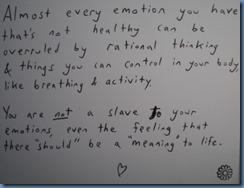Does meaning go further than emotion?
“We think, therefore we exist.” It’s a clever phrase, and difficult to refute. But thought can be little more than a computation.  A more pertinent phrase would be “we feel, therefore we live.” But today, as with Descartes’ quote, the fact that feeling is a crucial aspect of life is fairly obvious. So let’s take it to the extreme.
A more pertinent phrase would be “we feel, therefore we live.” But today, as with Descartes’ quote, the fact that feeling is a crucial aspect of life is fairly obvious. So let’s take it to the extreme.
In his book ‘The Passions’, Robert Solomon proposed that emotions literally are the ‘meaning of life’. What he meant by this was that emotions constitute frameworks of value and significance. Without emotions there would be no value, and therefore no meaning.
Is this true? Does meaning go any further than emotional implication?  In day to day life everything can be connected to emotion. The thing we remember most from any given day is always that thing which causes us to emote most, whether it be because it gave pleasure, pain or any other emotion. And even those mundane trivialities of life that we have to do, but may not result in any emotional engagement e.g. employment to do a task for another, are still purposefully carried out in order to avoid negative emotional implications were we not to do the tasks.
In day to day life everything can be connected to emotion. The thing we remember most from any given day is always that thing which causes us to emote most, whether it be because it gave pleasure, pain or any other emotion. And even those mundane trivialities of life that we have to do, but may not result in any emotional engagement e.g. employment to do a task for another, are still purposefully carried out in order to avoid negative emotional implications were we not to do the tasks.
However, if all of reality were nothing more than a stream of emotions and preceptors able to feel them, many people think that life would be more meaningless. In fact some people even believe both, seemingly opposing views.
On the meaning of life, Aristotle said:
“Happiness is the meaning and the purpose of life, the whole aim and end of human existence.”
It seems almost utilitarian of Aristotle to say such a thing, and the statement finds a great deal of acceptance today. And yet Aristotle also argued that were life nothing more than emotion, then life would mean less.
How can we hold such opposing views? Is there any meaning beyond emotion? How does one justify it? Is it simply that one source of emotional gratification today is justification relevant to tangible realities, and so we believe that we would always need such justification, simply because we don’t know of a world without it? Indeed the human mind is unable to imagine that which carries no weight in reality. We cannot imagine a colourless world, and as such are likely to remark that a world without colour would be worth less somehow. But isn’t that only because we know of colours? Even a person born blind has been told of colour, and wonders what they are missing. But if we had known nothing else, and if only two things existed: emotion, and the ability to feel; would we want for more? Does meaning go further than emotion?
Matthew Ratcliffe thinks the answer lies in the phenomenology of mood, which he describes as a generalised, background of feeling.
“Not all moods are generalized emotions. Some may indeed take this form but those that are responsible for the ‘meaning of life’ are not intentional states at all. Instead, they are part of the background structure of intentionality and are presupposed by the possibility of intentionally directed emotions.”
Ratcliffe gave the example of fear, which he says it would not be possible to experience without tangible cause. In other words Ratcliffe highlights the fact that the meaning of emotion hinges on our ability to think. After all, emotions are nothing more than chemicals unless they are processed and interpreted. And of course once we have the ability to think, we have the ability to doubt, to speculate, to make justifications and comparisons, and to build upon thoughts with still other thoughts. 
So, what does all of this mean? Is it possible to feel, and not think? Is there meaning without feeling? If we could feel and think, but not remember, would we want reality? Does meaning go any further than emotion?